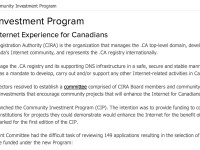Appeared in the Toronto Star on May 31, 2014 as Why Has the Canadian Government Given Up on Protecting Our Privacy? In recent years, it has become fashionable to argue that Canadians no longer care about their privacy. Supporters of this position note that millions of people voluntarily post personal […]
 Articles by: Michael Geist
Articles by: Michael Geist
What if the Government Passed Lawful Access Without Hearing from Any Privacy Commissioners?
Yesterday I appeared before the Standing Committee on Justice and Human Rights to discuss Bill C-13, the lawful access and cyberbullying bill. My comments focused on three issues: immunity for voluntary disclosure, the low threshold for transmission data warrants, and the absence of reporting and disclosure requirements. As Committee chair […]
From Coding Kids to Internet Exchanges: CIRA Community Investment Program’s First Round Recipients
The Canadian Internet Registration Authority today announced the first round of recipients in its Community Investment Program. I ran for the CIRA board in the hope that the organization would establish this kind of program and I’m thrilled to see it come to fruition. CIRA received 149 applications (I reviewed […]
The Trouble With Bill C-13: My Appearance before the Standing Committee on Justice and Human Rights
Earlier today, I appeared before the Standing Committee on Justice and Human Rights to discuss my concerns with Bill C-13, the lawful access/cyberbullying bill. My opening statement focused exclusively on privacy, pointing to problems with immunity for voluntary disclosure, the low threshold for transmission data warrants, and the absence of reporting and disclosure requirements. I’ll post a link to the transcript once available. In the meantime, I’ve posted my opening statement below.
Appearance before the House of Commons Standing Committee on Justice and Human Rights, May 29, 2014
What if the CBC Really Put Everything Up for Review?
The future of broadcasting has emerged as a hot issue with Canada’s broadcast regulator effectively putting everything up for grabs as part of its comprehensive TalkTV review of broadcasting regulation. Acknowledging the dramatic shift in the way Canadians access and interact with broadcasting, reforms to seemingly untouchable policies such as simultaneous substitution, genre protection, and over-the-air broadcasting are all on the table.
The Canadian Radio-television and Telecommunications Commission has effectively acknowledged that the world has changed and policies based on a different landscape merit a review. In the current market, scarcity has given way to abundance and broadcasters have ceded considerable control to consumers’ demands to watch what they want, when they want.
My weekly technology law column (Toronto Star version, homepage version) notes that Canada’s public broadcaster, the Canadian Broadcasting Corporation, is undergoing a similar review. If recent comments from its president Hubert Lacroix are any indication, however, there is no willingness to radically rethink its future. In a speech earlier this month to the Canadian Club of Montreal, Lacroix devoted much of his time to lamenting the budgetary challenges faced by CBC with unfavourable comparisons to support for public broadcasting in other countries.








